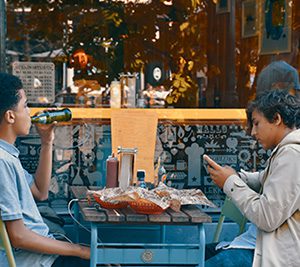Good Rapport is Essential to Create Good Relationships - NLP in Action
 First up we should start by defining what rapport is in NLP terms. Having bad rapport skills tends to alienate people. On the other hand having good rapport skills allows relationships both new and old flow freely. Wine expert and tv personality Ollie Smith is a great example of someone having good rapport skills. Building rapport should start right from the first time you meet someone with a good introduction.
First up we should start by defining what rapport is in NLP terms. Having bad rapport skills tends to alienate people. On the other hand having good rapport skills allows relationships both new and old flow freely. Wine expert and tv personality Ollie Smith is a great example of someone having good rapport skills. Building rapport should start right from the first time you meet someone with a good introduction.
What is Rapport?
The dictionary defines rapport as: “a good empathetic relationship between people who understand each other’s emotions and ideas by using good communication skills”. In other words, a close, respectful, comfortable relationship in which people who trust each other can see what you mean, empathise with you, are tuned into the same wavelength and are engaged well enough to hear what you are saying. People with good rapport will find conversation effortless and it will flow between them naturally.
Bad Rapport Should be Avoided at All Cost
 Most people can remember a situation when you have met someone for the very first time and they tell you their whole life story immediately! There is no small talk, no opportunity to get a word in edgeways. Just as bad, can you remember being introduced to someone and the first thing they did is take out their phone to look at instead of engaging in conversation with you?
Most people can remember a situation when you have met someone for the very first time and they tell you their whole life story immediately! There is no small talk, no opportunity to get a word in edgeways. Just as bad, can you remember being introduced to someone and the first thing they did is take out their phone to look at instead of engaging in conversation with you?
Just thinking about this now, how did that or would that make you feel? Uncomfortable? Dis-engaged? Unsettled? Bored? Embarrassed? Wanting to escape? It is usually not a great experience and leaves a very bad first impression. Let’s face it, you only have one chance at a first impression so, make it a good one if you can.
Creating Good Rapport Means Relationships Progress Better
 Creating or having good rapport will avoid the above situation and make for a far better one instead. A good way to do this is ask about someone you meet with genuine curiosity. Your aim here might be to find some common interests which you can discuss. In a business environment that might be, “What do you do in your work?”. In a social environment it might be, “Do you have family locally?”. If you understand the response, simply nodding and saying, “Oh good do tell me more.” pleasantly can be a good way to get the conversation started.
Creating or having good rapport will avoid the above situation and make for a far better one instead. A good way to do this is ask about someone you meet with genuine curiosity. Your aim here might be to find some common interests which you can discuss. In a business environment that might be, “What do you do in your work?”. In a social environment it might be, “Do you have family locally?”. If you understand the response, simply nodding and saying, “Oh good do tell me more.” pleasantly can be a good way to get the conversation started.
It is also very good to make eye contact both while building rapport and during a conversation. If you are looking around the room while someone you are talking with is in front of you they are going to feel de-valued and that you are not interested in them. However, while keeping eye contact, if you notice someone becoming slightly uncomfortable, in their body language, facial expressions or tone of voice, look away for a moment and then turn back smiling, nodding and agreeing.
Example of Good Rapport in Action
As an example or good rapport, I was sat next to Ollie Smith the wine expert around a dinner table at a wine and food evening he was hosting. Ollie is a well-known public figure with great rapport building skills. As he sat down, he introduced himself and asked my name. Using my name immediately he stated, “Ah well Kevin, I’m sorry but, it looks like your stuck with me for the evening.” We laughed and he continued, “So what do you do?”. I gave a quick summary reply and then responded, “I honestly thank you for your interest, Ollie. However, it would be far more interesting for everyone at the table if you could expand a bit on what you do?”
The conversation continued to go well. I and everyone else there had an interest in wine and food so, we talked about it for a good hour with occasional wit and a few laughs thrown in. Then he apologised politely and explained he had to move around the tables to make sure everyone got some of his company, just like a good host does.
The Introduction, Remembering and Using Their Name is Crucial
Dale Carnegie and a host of other authors would agree introducing yourself to a stranger and then asking who they are and perhaps what they do is crucial to good rapport. However, it is also good to use their name immediately and repetitively when you first meet means you are more likely to remember it. Someone’s name is the most important name on earth to that person. Looking them in the face as they tell you their name and remembering it is really important. Have you ever had a situation where you met someone new or even someone you know should know your name and they keep on forgetting it? How did that or would that make you feel? Having considered it you can understand how important this is to creating good rapport.
References:
Miller, P. (2008) The Really Good Fun Cartoon Book of NLP Crown House Publishing. Kindle Edition.
Kitchen J (2017) The Diploma in Clinical Hypnotherapy & NLP: Internationally Accredited Kindle Edition
Centre of Excellence (2023) NLP Master Practitioner Course – Module 3 Part 1

To me, having good rapport with someone means when you are talking it is effortless and things flow freely and naturally. I am a very nervous person in the company of stranger so how do I go about learning to do this?
Hi Sammy, You are completely right there. Generally we have good rapport with friends we have known for ages. If you are a bit shy and nervy with strangers it can be hard to get the conversation going. So, after a good introduction ask them an open question. Open question are ones that require a detailed answer. If it is a social situation, you might ask (using their name, with genuine honest interest) about their family, or their interests, or even compliment them on what they are wearing (if the situation warrants it) and then ask what they think of modern fashion. Then be quiet, nod agreeingly, smile and be honestly interested at their reply. You are after all asking a question of someone who has expert knowledge on the subject (their own family, interests or fashion likes) and people do love to talk about themselves. All the best, Kevin
Hi. I have just read your rapport article here and have found it useful. I am studying communication in a complementary therapy environment and this is exactly what I needed. Having good rapport is an essential part of any relationship and certainly required between a therapist and client. Thanks.
Hello Shiri and thank you for your comment. I would agree good rapport is really important in therapy. As a client you are looking for someone who understands you and your personal world. Also you must trust your therapist enough to be able to open up about your issues. All of this is part of the ethical and friendly service we provide here. All the best, Kevin